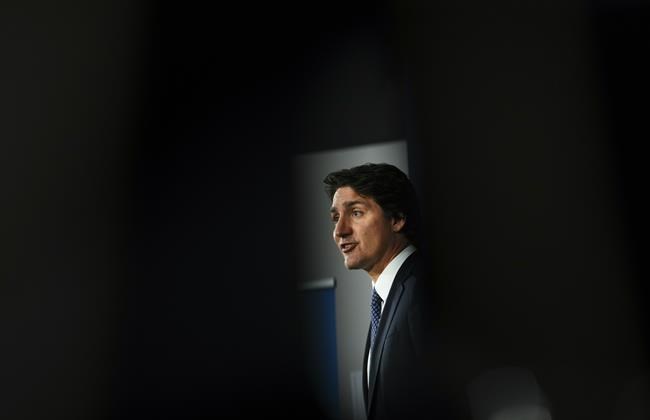Prime Minister Justin Trudeau cited the internment of Japanese- and Italian-Canadians during the Second World War on Monday as he urged caution in the face of growing calls for Canada to adopt a registry to track foreign influence efforts.
The comments came as authorities in the United States launched criminal proceedings against dozens of alleged Chinese government agents operating in that country.
Speaking at a news conference in the Ottawa suburb of Kanata, Trudeau acknowledged the federal government must find better ways to protect Canadians following reports of alleged interference by China in recent Canadian elections.
But the prime minister insisted a balance must be struck to ensure any new measures are not too broad and do not target certain diaspora groups such as Chinese-Canadians or others whose governments are at odds with Canada.
"Canada has had difficult historical experiences that we need to learn from when it comes to creating foreign-agent registries or registries of foreigners in Canada," he added.
"One has to only think of the internment of Japanese citizens, or Japanese-Canadians or Italian-Canadians during the past world wars to know that we must be very, very careful with these things."
Some 22,000 Japanese-Canadians were stripped of their belongings, forced from their homes and relocated into internment camps starting in early 1942, even though the vast majority of them were Canadian citizens.
About 600 Italian-Canadians faced similar treatment and another 31,000 were declared "enemy aliens" after Italy joined Nazi Germany during the Second World War. The federal government has since apologized to both communities.
The issue of foreign interference has been under debate amid media reports citing unnamed security sources and classified documents that allege China tried to interfere in the last two federal elections, as well as the recent municipal election in Vancouver.
On Monday, Trudeau said Chinese-Canadians are often the "first targets" of interference efforts by Beijing, and that any measure adopted by Canada must ensure vulnerable diaspora communities are not unduly hurt or affected.
He added that other groups, such as Iranian-Canadians, have been similarly targeted.
"That's why we're taking the time to consult appropriately on the foreign agent registry, and making sure that we're using it in the right ways."
Public Safety Minister Marco Mendicino announced last month that the Liberal government was beginning consultations on setting up a registry as part of its response to allegations of Chinese interference in recent Canadian elections.
The registry would require people who act on behalf of a foreign state to advance its goals to disclose their ties to the government employing them. It would be another tool, Mendicino said, to prevent other countries from meddling in Canada's affairs.
The idea of a registry, which exists in Australia and the United States, is to make those dealings more transparent, with the possibility of fines or even prison time for failing to comply.
The consultations run until May 9, including through a virtual portal on the Department of Public Safety's website.
In an interview with The Canadian Press last week, Mendicino said he met with a "robust cross-section'' of Chinese-Canadian community members who reinforced the need for a registry of agents acting on behalf of foreign governments in Canada.
Trudeau would not say whether it could be in place before the next federal election. The timing of that vote depends in part on the minority government's supply and confidence agreement with the federal New Democrats.
Canada isn't the only country grappling with allegations of Chinese interference.
Prosecutors in New York City took a big swing Monday at what they described as "audacious and illegal" efforts by Chinese government operatives to harass and threaten dissidents and suppress free speech on U.S. soil.
In three newly unsealed criminal complaints, Justice Department officials levelled charges against a total of 46 defendants, two of whom were living in the U.S. and operating a secret police station in lower Manhattan.
Lu Jianwang, 61, of the Bronx, and Chen Jinping, 59, of Manhattan, were to appear in court later Monday. They are charged with conspiring to act as agents of the government of the People’s Republic of China, and with obstructing justice — allegedly for destroying evidence of communications with officials in China's Ministry of Public Security, or MPS.
On at least one occasion, the police station was behind an effort to locate a pro-democracy activist of Chinese descent who was living in California, said Breon Peace, the U.S. attorney for New York’s Eastern District.
"The Chinese national police appear to have been using the station to track a U.S. resident on U.S. soil," Peace told a news conference.
"The defendants' actions under the direction of the Chinese government are flagrant violations of American sovereignty. ... And the MPS is on notice that we will not tolerate similar threats to our national sovereignty."
Comparable Chinese police operations have been identified in dozens of countries around the world, including in Canada, where RCMP investigators are looking at two community groups in Quebec that are alleged to be MPS outposts.
Those groups have denied the allegations, vowed to co-operate with police and insisted they stand opposed to all forms of intimidation and harassment.
The other two U.S. cases are focused on alleged efforts by Chinese operatives living overseas to harass Chinese nationals living in the U.S. whose political views and actions were "disfavoured" by the government in Beijing.
A "task force" of 34 MPS officers operated as an internet troll farm, Peace said, using fake online profiles and official PRC disinformation to "harass, disparage and threaten" dissidents and activists living all over the world.
"The official PRC disinformation suggested the weakness of U.S. democracy and foreign policy, sought to sow political divisions in U.S. national elections and convey conspiracy theories regarding the U.S. government’s alleged responsibility for the origins of the COVID-19 pandemic."
This report by The Canadian Press was first published April 17, 2023.
Lee Berthiaume and James McCarten, The Canadian Press



